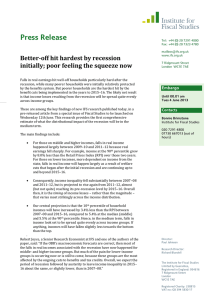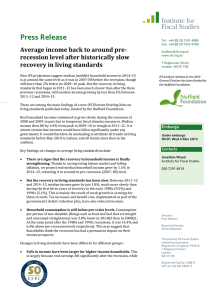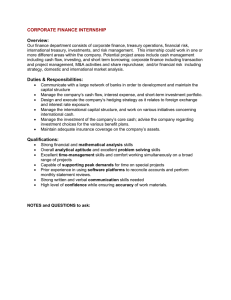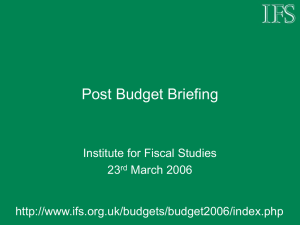Press Release
advertisement
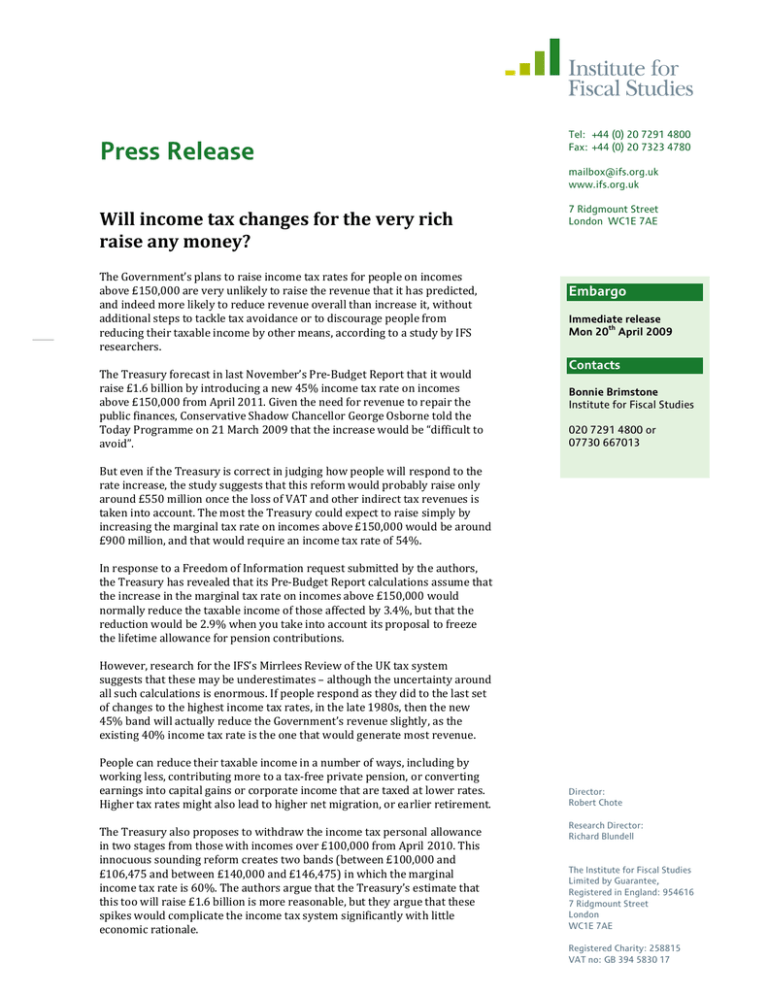
Press Release Tel: +44 (0) 20 7291 4800 Fax: +44 (0) 20 7323 4780 mailbox@ifs.org.uk www.ifs.org.uk Will income tax changes for the very rich raise any money? The Government’s plans to raise income tax rates for people on incomes above £150,000 are very unlikely to raise the revenue that it has predicted, and indeed more likely to reduce revenue overall than increase it, without additional steps to tackle tax avoidance or to discourage people from reducing their taxable income by other means, according to a study by IFS researchers. The Treasury forecast in last November’s Pre-Budget Report that it would raise £1.6 billion by introducing a new 45% income tax rate on incomes above £150,000 from April 2011. Given the need for revenue to repair the public finances, Conservative Shadow Chancellor George Osborne told the Today Programme on 21 March 2009 that the increase would be “difficult to avoid”. 7 Ridgmount Street London WC1E 7AE Embargo Immediate release Mon 20th April 2009 Contacts Bonnie Brimstone Institute for Fiscal Studies 020 7291 4800 or 07730 667013 But even if the Treasury is correct in judging how people will respond to the rate increase, the study suggests that this reform would probably raise only around £550 million once the loss of VAT and other indirect tax revenues is taken into account. The most the Treasury could expect to raise simply by increasing the marginal tax rate on incomes above £150,000 would be around £900 million, and that would require an income tax rate of 54%. In response to a Freedom of Information request submitted by the authors, the Treasury has revealed that its Pre-Budget Report calculations assume that the increase in the marginal tax rate on incomes above £150,000 would normally reduce the taxable income of those affected by 3.4%, but that the reduction would be 2.9% when you take into account its proposal to freeze the lifetime allowance for pension contributions. However, research for the IFS’s Mirrlees Review of the UK tax system suggests that these may be underestimates – although the uncertainty around all such calculations is enormous. If people respond as they did to the last set of changes to the highest income tax rates, in the late 1980s, then the new 45% band will actually reduce the Government’s revenue slightly, as the existing 40% income tax rate is the one that would generate most revenue. People can reduce their taxable income in a number of ways, including by working less, contributing more to a tax-free private pension, or converting earnings into capital gains or corporate income that are taxed at lower rates. Higher tax rates might also lead to higher net migration, or earlier retirement. The Treasury also proposes to withdraw the income tax personal allowance in two stages from those with incomes over £100,000 from April 2010. This innocuous sounding reform creates two bands (between £100,000 and £106,475 and between £140,000 and £146,475) in which the marginal income tax rate is 60%. The authors argue that the Treasury’s estimate that this too will raise £1.6 billion is more reasonable, but they argue that these spikes would complicate the income tax system significantly with little economic rationale. Director: Robert Chote Research Director: Richard Blundell The Institute for Fiscal Studies Limited by Guarantee, Registered in England: 954616 7 Ridgmount Street London WC1E 7AE Registered Charity: 258815 VAT no: GB 394 5830 17 As it is extremely unlikely that the Treasury will raise £3.2 billion from its two proposals, the authors consider alternative changes affecting the very rich that would raise equivalent amounts, assuming that the Treasury is correct in judging how the very rich will change their behaviour in response to such changes, but also allowing for the impact on indirect tax revenues. If the Treasury is correct in its assessment of people’s responses, then it could expect to raise £3 billion of the £3.2 billion by imposing a 60% tax rate on all incomes above £100,000 rather than just in the two narrow bands above £100,000 and £140,000. But by imposing this high a rate on those with incomes above £150,000 the Treasury would forego revenue unnecessarily. Instead, it could expect to raise the full £3.2 billion by levying the revenue maximising rate of 54% on incomes above £150,000, with a 59% rate on incomes between £100,000 and £150,000. Alternatively, it would though be possible to raise the full £3.2 billion by keeping the 60% bands and then applying a rate of 49% between £106,475 and £140,000 and above £146,475. These calculations underline the fact that it may well be impossible to raise any extra revenue from the roughly 1% of the population on the very highest incomes above £150,000, simply by increasing the income tax rates applied to incomes above that level. In addition, the scope for raising money from those between £100,000 and £150,000 is limited. The authors estimate that the Treasury could raise the £3.2 billion it is looking for by raising the current higher rate of income tax on incomes above £43,875 (which is due to be paid by about 10% of adults in 2011–12) from 40% to 43%. “Alistair Darling’s income tax increases for the rich will significantly complicate the tax system, and may well raise little revenue. A simpler and smaller increase in tax rates across a broader range of high-income taxpayers would raise the money the Treasury is looking for more efficiently, especially if combined with measures to make income tax harder to avoid”, said James Browne, senior research economist at the Institute for Fiscal Studies. ENDS Notes to Editors: 1. The full report, "Can More Revenue be Raised by Increasing Income Tax Rates for the Very Rich?", IFS Briefing note BN84, is available on our website: http://www.ifs.org.uk/bns/bn84.pdf). 2. Withdrawing the personal allowance leads to a 60% income tax rate in the following way. An individual with a pre-tax income of £100,000 and who received £100 additional income would pay 40% income tax on the £100, but, under the Government’s proposals, would also see their personal allowance reduced by half of the £100, or £50. A reduction in the personal allowance of £50 would lead to additional income tax liability of 40% on that £50. Income tax liability has therefore risen by £60 when pre-tax income has risen by £100, giving a 60% income tax rate. The Institute for Fiscal Studies Limited by Guarantee, Registered in England: 954616 7 Ridgmount Street London WC1E 7AE
